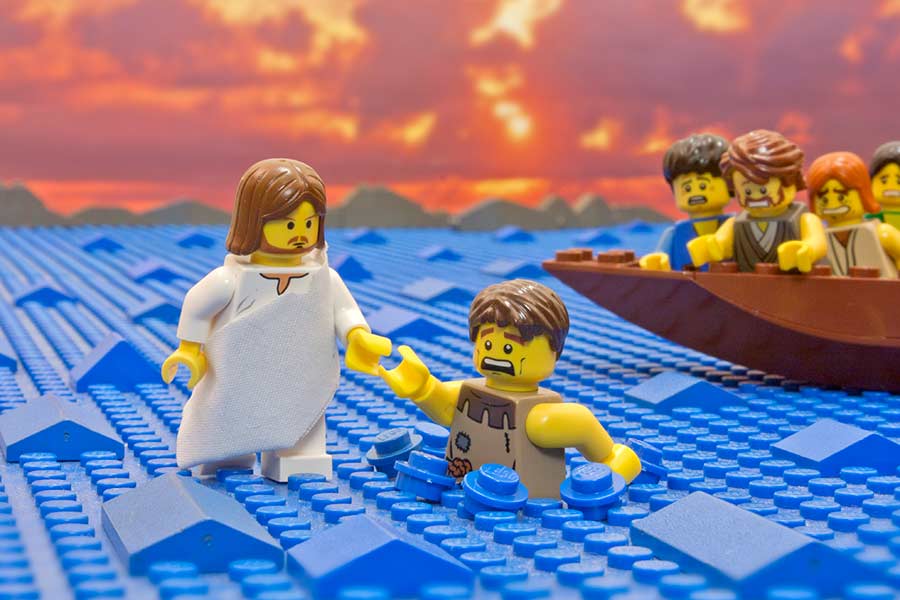
swipe image, click side of image, or use arrow keys to advance →

It is of primary importance to know the nature of our god and how he came to be what he is. Very few people have a correct understanding of this, but here is the great secret: Heavenly Father was once as we are now, a mortal man of flesh and blood living on an earth that was created by his Father in Heaven.

Little has been revealed to us about Heavenly Father's mortal life. But it is key to understand that all mortal men have the seeds of godhood within them, and all mortal men who have become gods have done so by going from one small degree to another, and from a small capacity to a great one; from grace to grace, from exaltation to exaltation until arriving at the station of a god.

Heavenly Father has the same form as mortal men, but has a glorified body of flesh and bones that is as tangible ours. He is all-powerful, all-knowing, and is just and righteous in all things. He cannot die, feel pain, or become sick, but he has feelings and can be happy, sad, or angry.

The place where Heavenly Father dwells is a place more beautiful than the earth. It is a place of peace, justice, truth, and mercy. The name of the star closest to the presence of Heavenly Father is Kolob. One revolution of Kolob takes 1,000 Earth years, so a day where Heavenly Father dwells is equal to 1,000 years on Earth.

Time has neither a beginning nor an end. "In the beginning" is a relative term since there has never been a time without gods, worlds, and men, and there never will be. Before being altered, the first sentence of the Bible read: "The head one of the gods brought forth the gods." This head god—the Eternal God of all other gods—convened a grand council, and all the gods sat in the heavens to contemplate the worlds which were created at that time.
Sources:
• Old Testament Student Manual Genesis-2 Samuel, (1980), 26–36
• Nielsen, Kent. People on Other Worlds. New Era Magazine of the LDS Church. April 1971.
• Smith, Joseph. “The King Follet Sermon” Ensign: The Magazine of The Church of Jesus Christ of Latter-Day Saints, April 1971.
• Doctrines and Covenants 121:32

At this council, the gods came up with a plan to create the world and people it. The head god appointed one god for us. Our god's name is Elohim. He is the father of our spirits, and so he is also known to us as Heavenly Father. Although other gods exist, Heavenly Father is the only being we should worship.

Heavenly Father has a wife-partner known as Heavenly Mother. We are the literal offspring of our heavenly parents who procreated our spirit bodies. The firstborn spirit child of our heavenly parents was Jesus Christ, and from the beginning he has held the preeminent position before the Father.
Sources:
• Doctrines of the Gospel Student Manual, (2000), 6–8
• Becoming Like God, The Church of Jesus Christ of Latter-Day Saints. 24 February 2014.
• Cannon, Donald Q., Larry E. Dahl, and John W. Welch. The Restoration of Major Doctrines through Joseph Smith: The Godhead, Mankind, and the Creation. Ensign Magazine of the LDS Church. January 1989.
• Doctrines of the Gospel Student Manual, (2000), 9–10

Heavenly Father did not create his spirit children out of nothing, for the intelligence of spirits is self-existent and has no beginning or end. Indeed, all matter exists eternally and to say that Heavenly Father gave birth to us is to say he organized our previously chaotic matter into individual spirit beings.

Our spirits are the begotten sons and daughters of Heavenly Father. Spirit bodies look exactly the same as mortal bodies inside and out, but they are made from a more pure and refined substance. Just as every living creature propagates its own kind, all of Heavenly Father's offspring have a divine nature and destiny. All of us have the potential to become gods ourselves.

Heavenly Father made men in his own image and he made women in the image of his wife-partner. Although there is no doubt that we have a Heavenly Mother, little has been revealed about her. It is inappropriate for anyone to pray to our Heavenly Mother, but the fact that we do not pray to her does not denigrate or belittle her in any way.

Gender is an essential characteristic of our eternal identity and purpose. Some roles are best suited to a masculine nature and some roles to a feminine nature. Women's natural attributes, affections, and personalities are entirely different from a man’s and consist of faithfulness, benevolence, kindness, and charity. They balance the more aggressive and competitive nature of a man, whose role is that of protector and provider.
Sources:
• "Gender Is an Essential Characteristic of Eternal Identity and Purpose". Ensign Magazine of the LDS Church. October 2008.
• Andersen, Neil L. “Power in the Priesthood”. General Conference Report, October 2013.
• Andersen, Neil L. “Power in the Priesthood”. General Conference Report, October 2013.
• Eternal Marriage Student Manual, (2003), 63–72
NEXT:
Our Premortal Lives
[click image to continue]
Also from the creator of The Brick Book of Mormon:


